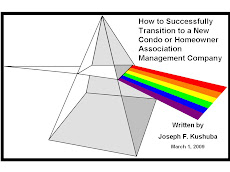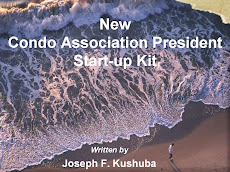
Effective communication skills form the foundation for successful management of a condo or homeowner association. They are so fundamental that we sometimes forget their significance or assume we are skillful. Communication skills enable you as a Board member to lead others. You cannot lead without being able to communicate your ideas well. People will not go with you unless you have established with them your ability to lead. That requires trust which is a by-product of effective two-way communication.
Show me an association that is rift with problems (including, member in-fighting and discontent, distrust and a very active rumor mill, etc.) and I will show you either incompetent Board members or ineffective communications, or both!
The intent of this article is twofold. The first describes how you can improve your personal communication skills and the second describes a high return communication technique that can be used with your association.
Effective personal communication includes; speaking and listening, informing others, and fostering open communication. When you master these skills, you harness a great deal of power – the power to get things done through others.
Effective personal communication involves:
- Knowing who needs what information and communicating that information in a concise and timely way
- Choosing and effectively using the most appropriate communication medium – oral or written – for those who will receive the information and how it will be used
- Knowing how to listen effectively
Shown below are some important personal communication skills to master.
- Speak effectively. You should make an effort to get your point across when talking and avoid rambling. Outline in your mind what you are trying to say and then stick to it. Try to eliminate speech habits that may annoy others, such as talking too slowly, too rapidly, or too hesitatingly. Become more animated in your style by using appropriate gestures and body language to “punctuate” you discussion. Also, work at varying your volume, pitch, and pace to emphasize your major points in discussions.
- Foster open communication. To build trust and solid working relationships with association members, it’s important to be seen as someone who is committed to sharing information with others and who goes beyond communicating only what is necessary. Developing a climate in which you and your members are open with information is critical in order to function effectively. You should find out what members want to know. Most are interested in things that impact them personally. Use the informal grapevine communication network as a way of keeping others informed. Wander around, have coffee with people, ask them questions, and so on. A proven communication strategy is to “over-communicate” rather than “under-communicate”, even if it means that you may have to retract something in the future. Just preface those types of communications with the statement, “this is what we know at this time, but it could change in the future -- so don’t hold me to it.” In other words, don’t wait to communicate something important until everything is finalized. Provide on-going updates as they occur and if you don’t want to communicate something at a point in time, let everyone know when they can expect to hear something.
- Listen to others. Listening involves hearing the speaker’s words, understanding the message and its importance to the speaker, and communicating that understanding to the speaker. It is key to developing and maintaining relationships, making decisions, and solving problems. When listening always follow this order: 1) hear, 2) understand, 3) interpret, and 4) respond; don’t jump from “hear” to “respond” without making sure you understand.
Communications with association members should not be left to chance – it should be carefully planned and managed. A useful technique for a Board to consider is the development a “staged communication plan” that provides a regular flow of information that addresses the things on their member’s minds along with the things that the BoD wants to communicate to them. This plan identifies what information will be communicated (new information, progress to date, anticipated problems, decisions made), how it will be communicated (personal contact, letter or email, group meeting), by whom will it be communicated (President, Secretary, all BoD), and when will it be communicated (date, frequency). Below is a sample plan.
As required or immediate
BoD decisions, meeting minutes, CC&R reminders, rumor control, emergency situations, breaking news, status report on key issues, notice of special assessments (anticipated or assessed), volunteer recognition, informational items (impending legislation, changes in the property tax assessment, sightings of unique wildlife, special events, new bike riding trails, fall color tours in the area, increases in water/sewer/trash collection, etc), highlight real people enjoying the facilities (special gatherings, normal day-to-day use, etc), feature articles of members, their families, hobbies, special achievements etc., changes in operations, such as major repair work on the pool, etc.
Monthly
Financial performance (budget vs. actuals), President letter (status report on key issues, breaking news, informational items)
Quarterly
Encourage & recognize volunteers (look for examples and reasons to thank someone), feature article on a committee activity or a particular aspect of condo or homeowner association life, any special accomplishments,
Annual
Year end letter (accomplishments, future outlook, holiday wishes), annual budget and maintenance fees, annual meeting notice and minutes, event calendar, contacts and procedures for requesting vendor services









7 comments:
Great post. I feel exhausted but I enjoyed reading it because I learned so much from it.
Deirdre G
makati condo
It was long ago since I visit your blog and its mhe again, visiting and reading along..
Deirdre G
makati condo
Great Post! It's very nice to read this info from someone that actually knows what they are talking about. HOA Management Arizona
You need effetive communication skill to actively take part in condo association. Read the post for more information
condo launch Singapore
Nice blog, thanks for sharing it here.
RES
One can improve his/her communication skill by practicing a lot or by writing essays regularlyresearch essays Writing
As the Secretary of my Homeowner Association in Fort Collins, it’s sometimes a challenge trying to maintain work, family and my HOA duties . However, when I discovered Association Online all of that changed. No need to worry about piles of paperwork, their software is quite easy to use and all our HOA documents are stored and managed online. This allows our Board of Directors to operate in a more effective way. You should check them out at www.associationonline.com or call (970-226-1324). I highly recommend them for all Homeowner Association needs.
Post a Comment